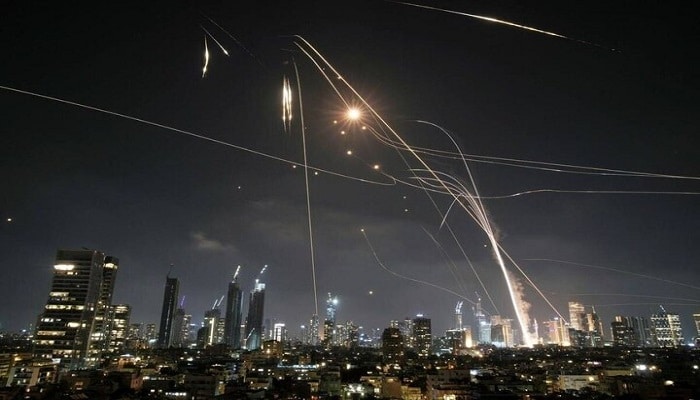PNN – The collapse of the Zionist regime’s defense capabilities, the fear of a war of attrition, and the fear of a serious change in the regional and trans-regional balance in favor of Iran forced the United States to enter a field where defeat was certain.
After 12 days of heavy fighting, a ceasefire was established between Iran and the Zionist regime; but the main question in security and geopolitical analyses remains: why did the United States directly enter this aggressive war?
The White House’s decision to engage militarily can be examined not only from the perspective of supporting the Zionist regime as its traditional ally, but also from the perspective of Tel Aviv’s deep structural weakness, concerns about the conflict devolving into a long-term war of attrition, and fears of shifting the regional balance of power in favor of Iran.
Read more:
English-speaking users of “X”: The ceasefire was a symbol of Iran’s authority and rationality
The collapse of the myth of the Zionist regime’s invincibility
For decades, the Zionist regime had built an image of impenetrable security for itself, based on intelligent deterrence, unrivaled intelligence capabilities, and advanced defense systems such as Iron Dome, David’s Flask, and Arrow. But during the 12-day war with Iran, this myth collapsed—not in the media or propaganda, but on the actual battlefield.
Iran launched direct and multi-layered attacks against the strategic depth of the Zionist regime; attacks from the south and north, through suicide drones, cruise missiles, ballistic missiles, and even firing from surface vessels in the Persian Gulf, effectively put Israel’s defense systems in a state of panic.
For example, in the early hours of the third day of the war, Iranian missiles were fired at vital areas in Tel Aviv, Haifa, Ashkelon, and Dimona. Iranian missiles hit critical industrial infrastructure, power lines, fuel tanks, and military bases. The images that were released of a direct hit north of Tel Aviv, a nationwide power outage in Haifa, and widespread disruption at Ben Gurion Airport caused a psychological shock in public opinion in the occupied territories and its Western supporters.
Tel Aviv’s Strategic Isolation and Security Borrowed from Washington
One of the most important lessons of the 12-day war for regional and global observers was the revelation of the military and strategic reality of the Zionist regime without reliance on unconditional US support. Contrary to the propaganda of the past few decades of security self-sufficiency and independent offensive capability, this battle showed that Israel, even in defending its strategic depth, is heavily dependent on US technical, intelligence, and operational support.
In the first 48 hours of the war, the Israeli army command attempted to control the psychological atmosphere of society by issuing aggressive statements and displaying power in the media; but Iran’s crushing, precise, and multi-stage response overturned all of Tel Aviv’s initial estimates. With Iranian missiles hitting two key bases in the Negev Desert and a drone hitting the Haifa power plant, the Israeli army was paralyzed in some vital areas. As the attacks continued and the Iron Dome interceptor and tracking equipment warehouses were emptied, Zionist officials were forced to request urgent weapons and intelligence assistance from the Pentagon.
On the fourth day of the war, the Haaretz newspaper revealed that a joint emergency meeting between Israeli army commanders and representatives of CENTCOM (the US Central Command in the region) was held at the Carmel military headquarters, during which Tel Aviv effectively requested the immediate delivery of dozens of interception systems, anti-ship systems, Tamir missiles, and defense drones. A few hours later, American military aircraft carrying state-of-the-art equipment entered the occupied territories from the Ramstein Air Base in Germany. This event was a historic moment in which the fabricated wall of the Zionist regime’s defensive independence practically and publicly collapsed.
Ultimately, what happened in this war was more than a request for military assistance or strategic cooperation. The Zionist regime was shown to be incapable of maintaining its military and security presence against Iran without America, not tactically but in its strategic foundation.
The Western-Jewish strategic axis fears the erosion of the battle
At the heart of America’s decision to enter the war directly was, above all, the fear of sinking into a bog of attrition and uncontrollability. Washington knew full well that a war with Iran, unlike short-term conflicts with non-state actors, could escalate into a months-long crisis with regional and global consequences. Contrary to traditional Western calculations, Iran not only has extensive military power on its soil, but with a network of regional allies, it has created a capacity for intelligently prolonging the conflict that is unpredictable.
From the fifth day of the war, signs of a long-term conflict became apparent: Iran’s continued firing of precision missiles, the declaration of readiness in southern Lebanon, rocket attacks from Iraq on US bases in Syria, the threat of Yemen’s Ansarullah to close Bab al-Mandab, and on the other hand, the gradual fatigue of the Israeli army from repeated interceptions, troop movements, and heavy pressure on logistics. The same analysis was clearly stated in American military centers, where a Pentagon report on the eighth day of the war warned: Continuing the current trend will degrade Israel’s defense capabilities within two weeks.
The experience of Afghanistan, Iraq, and even Libya also remains in America’s strategic memory, where a few-day conflict turned into a multi-year crisis and brought incalculable costs. Now, the same pattern was about to repeat itself in the heart of the Middle East, except that the opponent was a regional power with missile and drone capabilities. The United States understood well that the longer this battle dragged on, the greater the economic, psychological, and geopolitical costs would be for its ally Israel and, consequently, for Washington itself.

